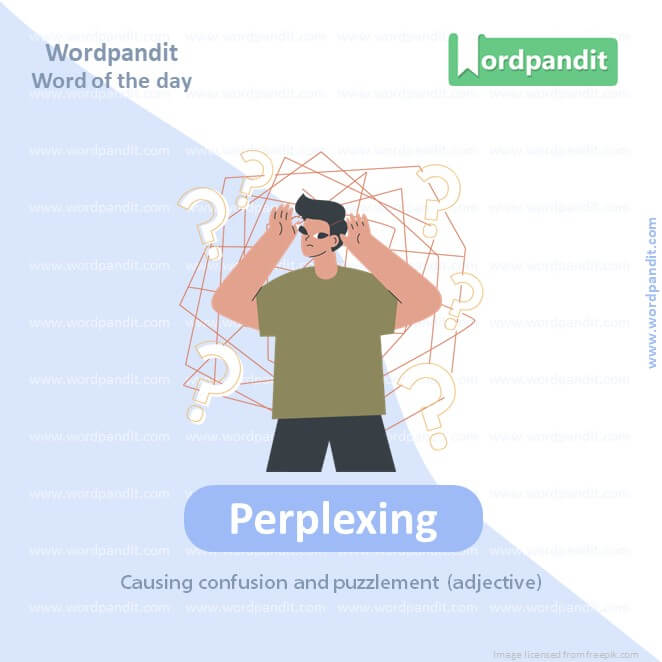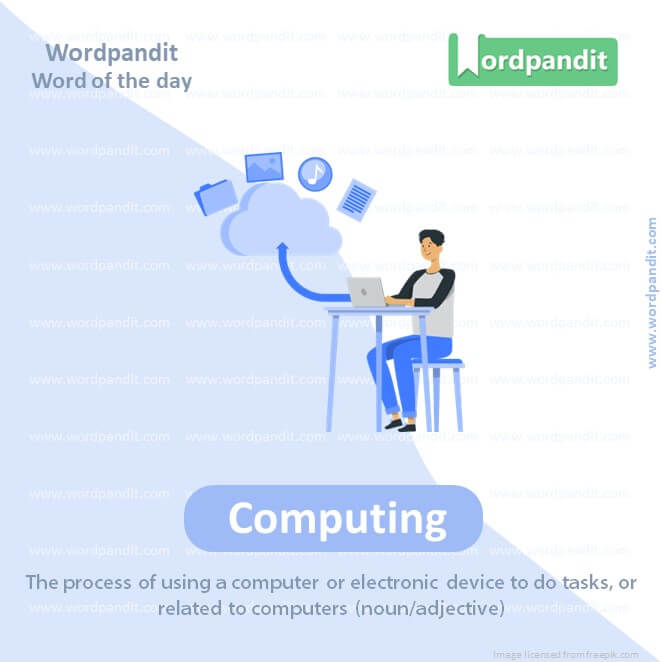Daily Vocabulary Words: List of Daily Used Words in Leading Indian Newspapers
Hi there. Welcome to this special section @ Wordpandit. Our endeavour here is straightforward: highlighting daily vocabulary words that you would come across in leading newspapers in the country. We have included the following newspapers in our selection:
• The Times of India
• The Economic Times
• Hindustan Times
• Mint
• Indian Express
We are putting in extensive work to develop your vocabulary. All you have to do is be regular with this section and check out this post daily. This is your repository of commonly used words; essentially, we are posting a list of daily used words. Hence, this has significant practical application as it teaches you words that are commonly used in leading publications mentioned above.
Visit the website daily to learn words from leading Indian newspapers.

WORD-1: Tentative
CONTEXT: The above estimates are tentative and we can have better analysis once the unit-level data is released.
SOURCE: Indian Express
EXPLANATORY PARAGRAPH: Imagine you want to play outside, but it looks like it might rain. You’re not sure if you should go or not because you don’t know if it will rain or not. That feeling of not being sure and waiting to see what happens is called being “tentative.”
MEANING: Not certain or fixed; done without confidence (adjective)
PRONUNCIATION: TEN-tuh-tiv
SYNONYMS: uncertain, hesitant, cautious, indecisive, hesitant, unsure
USAGE EXAMPLES:
1. She made a tentative plan to visit the zoo, but it depended on the weather.
2. He gave a tentative answer because he wasn’t sure of the correct one.
3. The decision was only tentative until further information was gathered.
4. The team made tentative arrangements for the upcoming project, subject to change.

WORD-2: Perplexing
CONTEXT: What is perplexing is that the difference in India between the NSS and the NAS consumption is widening over time.
SOURCE: Indian Express
EXPLANATORY PARAGRAPH: Have you ever tried to solve a puzzle, but it’s really tricky and you just can’t figure it out? That feeling of being confused and puzzled is what we call “perplexing.”
MEANING: Causing confusion and puzzlement (adjective)
PRONUNCIATION: per-PLEK-sing
SYNONYMS: confusing, puzzling, baffling, bewildering, mystifying, intricate
USAGE EXAMPLES:
1. The perplexing riddle took hours to solve.
2. The instructions for the game were so perplexing that no one could understand them.
3. She had a perplexing expression on her face as she tried to understand the math problem.
4. The ending of the movie was so perplexing that viewers debated its meaning.

WORD-3: Computing
CONTEXT: Such a large difference has implications for computing the poverty ratio.
SOURCE: Indian Express
EXPLANATORY PARAGRAPH: You know how you use your tablet or computer to play games or watch videos? Well, the stuff that makes those devices work, like the games and apps, is all part of something called “computing.” It’s like a big brain that helps your devices do cool things!
MEANING: The process of using a computer or electronic device to do tasks, or related to computers (noun/adjective).
PRONUNCIATION: kuhm-PYOO-ting
SYNONYMS: programming, data processing, digital, electronic, IT (Information Technology)
USAGE EXAMPLES:
1. He studied computing at university and now works as a software engineer.
2. The computing power of modern smartphones is incredible compared to older models.
3. She’s taking a class in computing to learn how to create her own apps.
4. The company invested heavily in computing infrastructure to improve efficiency.
WORD-4: Conveyance
CONTEXT: the shares of toiletries and household items, conveyance and durable goods increased significantly in both rural and urban areas.
SOURCE: Indian Express
EXPLANATORY PARAGRAPH: When you need to move something from one place to another, you use something like a wagon or a truck, right? Well, the act of moving things from one place to another is called “conveyance.” It’s like giving something a ride to where it needs to go!
MEANING: The action or process of transporting or carrying something from one place to another (noun).
PRONUNCIATION: kun-VEY-uhns
SYNONYMS: transportation, transfer, carriage, shipment, delivery, transport
USAGE EXAMPLES:
1. The conveyance of goods from the warehouse to the store was done by truck.
2. Public conveyance such as buses and trains is essential for urban transportation.
3. The company offers free conveyance of furniture for customers who purchase large items.
4. The conveyance of information through emails has revolutionized communication.

WORD-5: Conscience
CONTEXT: His release is a welcome return to judicial conscience. It should mark a turning point
SOURCE: Indian Express
EXPLANATORY PARAGRAPH: You know how when you do something naughty, you feel a little bad inside? That little voice inside your head that tells you what’s right and wrong, that’s your “conscience.” It’s like having a tiny guardian angel helping you make good choices!
MEANING: An inner feeling or voice viewed as acting as a guide to the rightness or wrongness of one’s behavior
PRONUNCIATION: KAHN-shuhns
SYNONYMS: moral sense, sense of right and wrong, ethics, principles, integrity, scruples
USAGE EXAMPLES:
1. His conscience wouldn’t let him cheat on the test, even though he was tempted.
2. She followed her conscience and returned the lost wallet to its owner.
3. His conscience troubled him after he lied to his parents.
4. The character in the story wrestled with his conscience before making a difficult decision.
WORD-6: Piercing
CONTEXT: The judgment, based on a piercing scrutiny of the law and evidence on record, is a welcome, albeit belated, affirmation of the Constitution’s libertarian promise.
SOURCE: Indian Express
EXPLANATORY PARAGRAPH: Have you ever heard a really loud noise that felt like it went straight into your ears? Well, imagine if that noise was like a sharp arrow going into your ears, making you want to cover them! That’s what we mean when we say something is “piercing.” It’s like a sound or feeling that’s really sharp and strong.
MEANING: Something extremely loud or high-pitched, or something that seems to penetrate deeply (adjective).
PRONUNCIATION: PEER-sing
SYNONYMS: sharp, shrill, ear-piercing, penetrating, loud, strident
USAGE EXAMPLES:
1. The piercing sound of the fire alarm woke everyone up.
2. She let out a piercing scream when she saw the spider.
3. The piercing cold wind made it difficult to stay outside for long.
4. His piercing gaze made her feel uncomfortable.
WORD-7: Affirmation
CONTEXT: The judgment, based on a piercing scrutiny of the law and evidence on record, is a welcome, albeit belated, affirmation of the Constitution’s libertarian promise.
SOURCE: Indian Express
EXPLANATORY PARAGRAPH: You know when you do something good, like finish your dinner or help clean up, and someone says, “Good job!” or “Well done!”? That’s called giving you “affirmation.” It’s like getting a big high-five for doing something great!
MEANING: The action or process of confirming or stating something positively, or a statement that confirms or asserts something positively (noun).
PRONUNCIATION: af-er-MEY-shuhn
SYNONYMS: confirmation, assertion, declaration, validation, approval, recognition
USAGE EXAMPLES:
1. She smiled with affirmation when her teacher praised her drawing.
2. The boss gave her affirmation for completing the project ahead of schedule.
3. His parents’ affirmation encouraged him to keep trying his best.
4. The agreement was made with mutual affirmation from both parties.
WORD-8: Resounding
CONTEXT: In a resounding and reasoned rejection of the state’s case, the court held that merely downloading information about “Naxal philosophy
SOURCE: Indian Express
EXPLANATORY PARAGRAPH: You know when you hit a drum really hard and it makes a big booming sound that echoes everywhere? That’s what we mean when we say something is “resounding.” It’s like a big sound that fills up the whole space!
MEANING: Producing a loud, deep, and prolonged sound, or being unmistakable and emphatic (adjective).
PRONUNCIATION: ri-ZOWN-ding
SYNONYMS: booming, thunderous, echoing, reverberating, emphatic, loud
USAGE EXAMPLES:
1. The team celebrated their victory with a resounding cheer.
2. Her speech was met with resounding applause from the audience.
3. The resounding crash of thunder startled everyone awake.
4. The resounding success of the charity event raised thousands of dollars.
WORD-9: Sympathising
CONTEXT: even sympathising with their philosophy would not invite the rigours of the UAPA and that the prosecution had failed to establish an active role of the accused with particular incidents of violence and terrorism.
SOURCE: Indian Express
EXPLANATORY PARAGRAPH: You know when your friend falls down and hurts themselves, and you feel sad because they’re sad? That feeling of understanding and sharing their feelings is called “sympathizing.” It’s like being a good friend and feeling what they feel!
MEANING: Feeling compassion or understanding for someone else’s feelings or difficulties (verb – present participle).
PRONUNCIATION: SIM-puh-thahy-zing
SYNONYMS: empathizing, understanding, commiserating, comforting, supporting, sharing
USAGE EXAMPLES:
1. She sat quietly, sympathizing with her friend who was going through a tough time.
2. He showed sympathy by sympathizing with the victims of the natural disaster.
3. The teacher spent time sympathizing with the student who was feeling anxious about the exam.
4. Sympathizing with their neighbor’s loss, they brought over a meal to offer support.

WORD-10: Reaffirmed
CONTEXT: The court scoffed at “vague allegations” pressed by the prosecution as the basis of criminal conviction and thereby reaffirmed the first principles of criminal jurisprudence.
SOURCE: Indian Express
EXPLANATORY PARAGRAPH: You know when you promise to do something, and then you say it again just to make sure everyone knows you really mean it? That’s called “reaffirming.” It’s like saying, “I promise, and I mean it!”
MEANING: To state again strongly; to confirm or repeat (verb)
PRONUNCIATION: ree-uh-FURMD
SYNONYMS: confirm, assert, reassert, validate, reaffirm, emphasize
USAGE EXAMPLES:
1. The president reaffirmed his commitment to the nation’s security.
2. She reaffirmed her support for the project during the meeting.
3. After some doubts were raised, the decision was reaffirmed by the committee.
4. The teacher reaffirmed the importance of studying for the upcoming exam.
Vocabulary Sentence
The task of mastering language stretches beyond the realm of solitary words. It invites us to construct and comprehend a ‘vocabulary sentence’. This amalgamation of words into meaningful sentences adds layers to our linguistic prowess. However, effectively learning from a ‘vocabulary sentence’ requires some strategic insight. So, how should we approach it?
Firstly, when encountering a ‘vocabulary sentence’, it’s pivotal to comprehend the word in context. Deciphering its place and role in the sentence gives a deeper insight into the word’s meaning, usage, and nuances. This approach aids in firm retention and active application of words.
Another technique to master a ‘vocabulary sentence’ is to break it into manageable chunks. Look at each word, understand its function, and then put it all together to comprehend the sentence as a whole. This step-by-step dissection and understanding better cements the ‘vocabulary sentence’ into your learning.
Mimicking the prosody and rhythm of language while practicing ‘vocabulary sentence’ can also foster better learning. In this regard, listening to podcasts or watching videos in the target language can be exceptionally beneficial. They showcase real-life demonstrations of how words are strung together into sentences with correct stress patterns and intonations.
Lastly, crafting your own ‘vocabulary sentence’ with learnt words strengthens understanding and boosts recall. Be it during conversation or writing, actively using these sentences plays a key role in contextual learning.
In essence, unfolding a ‘vocabulary sentence’ is a treasure trove of learning opportunities. With proper understanding, breaking sentences into chunks, mimicking prosody, and actively crafting sentences, the journey of learning from a ‘vocabulary sentence’ becomes engaging and fruitful. Every sentence learnt and applied is a valuable catch in the linguistic sea!







